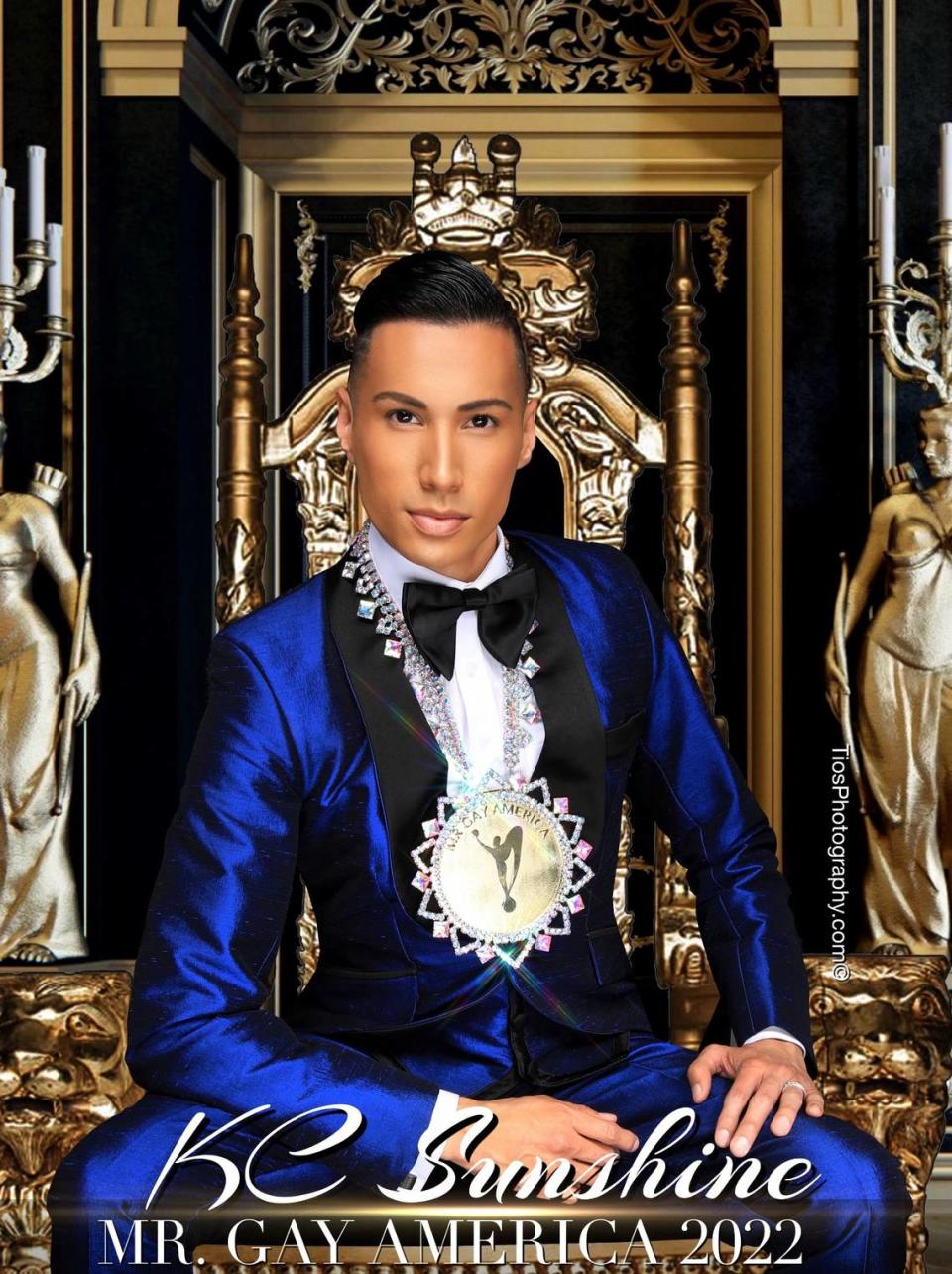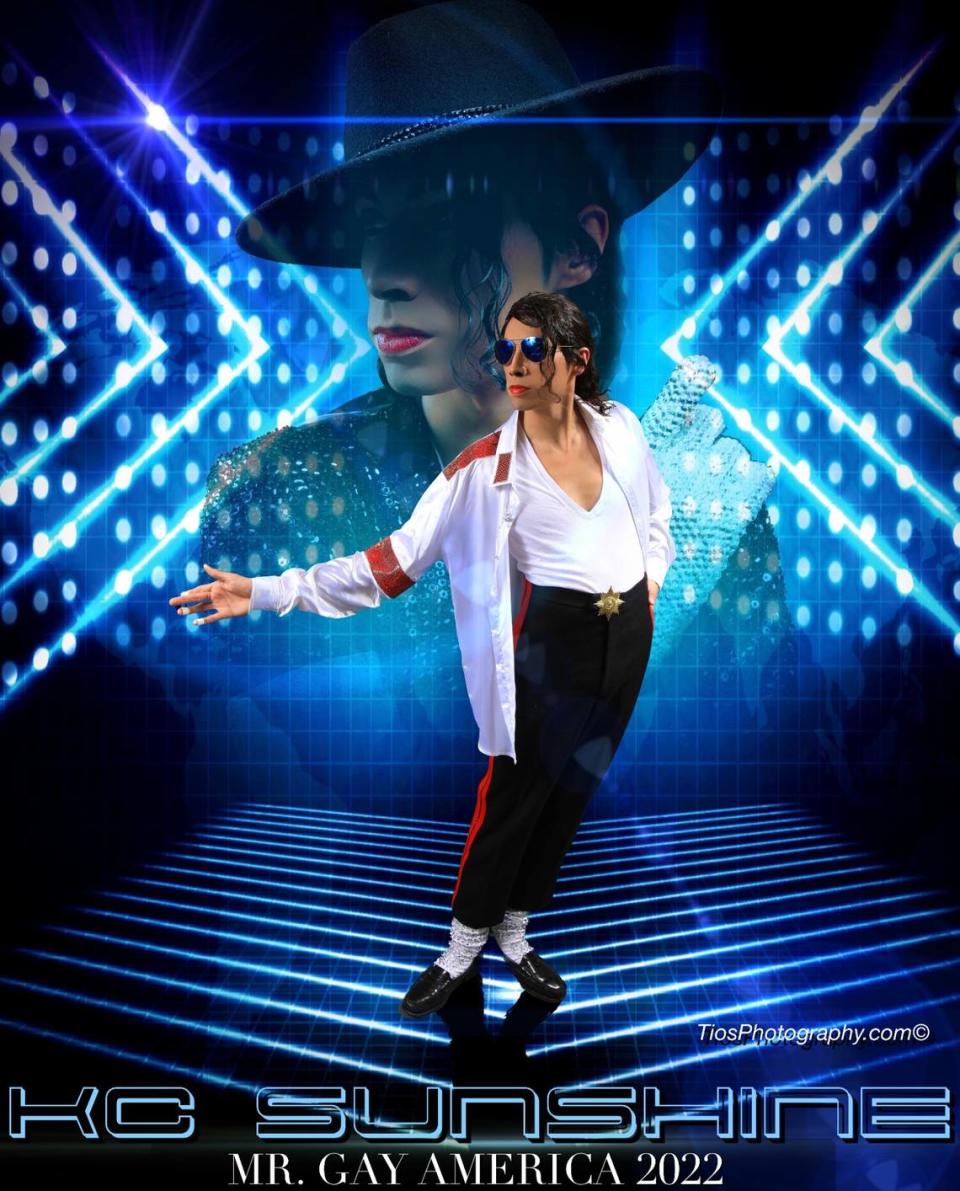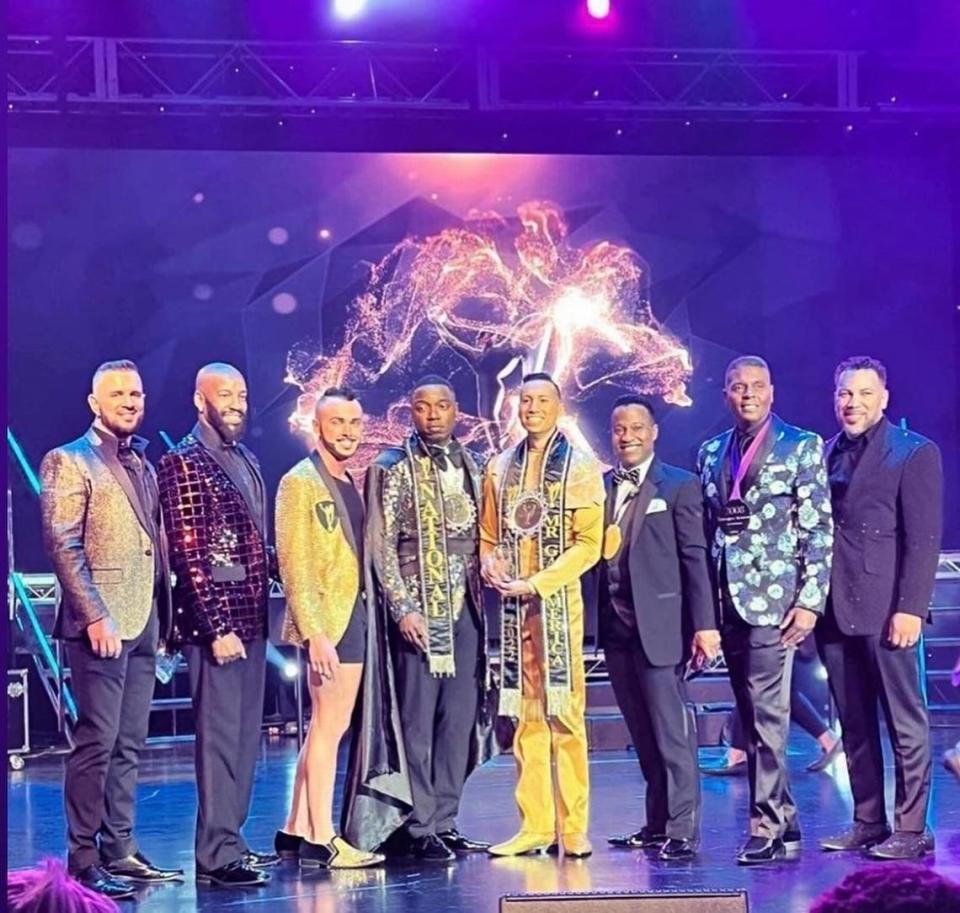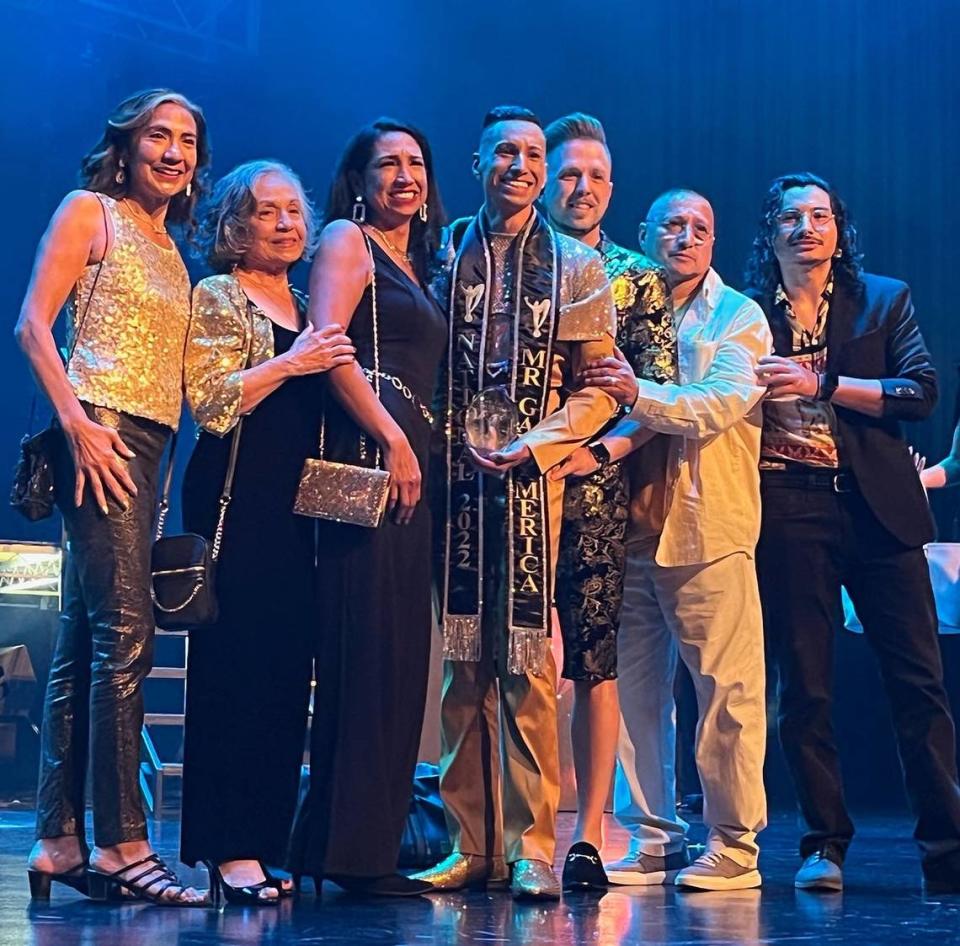Meet Mr. Gay America: A Kansas City teacher using his platform to celebrate diversity
At Westport’s Café Corazón, Aniseto Herrera-Lyell orders a cup of coffee and a tamale. The barista brings the order to the table, and he thanks her in Spanish. As a long-time customer and nephew of the owners, he knows the staff well.
He’s working on his lesson plans for his fourth grade class while sipping on an iced horchata latte, as well as his newsletter “A Ray of Sunshine.” In every sense of the phrase, it’s his home away from home.
Herrera-Lyell has been touring the country for the past nine months after winning Mr. Gay America — the oldest gay male pageant in the country — in 2022. Since last June, Herrera-Lyell has been to Dallas, Texas; Salt Lake City, Utah; Washington D.C; Atlanta, Georgia and Nashville, Tennessee. To end Pride Month, he stayed in his home state with a visit to Joplin.
Although he loves the activism, he and his family can’t help but worry about the anti-LGBTQ and anti-transgender bills picking up pace across the country. He said it was especially worrisome when he didn’t know if he could attend the Pride Parade in Nashville.
It wasn’t until a federal judge ruled Tennessee’s anti-drag law, which banned drag shows in public spaces, as unconstitutional that Herrera-Lyell got the go-ahead to perform his signature Michael Jackson drag at the parade.
However, he said, it’s not just a “drag thing.”
“Drag is the least of my worries right now,” he said. “I’m worried about the trans community — not just the adults but also the youth that are being attacked and told ‘you can’t be who you are.’”
Back in Kansas City, he held a drag story time with kids — where he not only got to connect with kids, but also allowed them to take pictures with the medallion he won as the winner of Mr. Gay America.
The people there were amazing, he said, the comments on Facebook — after the post about it went viral — were not.
“It just proves that it is making a difference,” he said. “Change scares people.”
‘Man in the mirror’
When Herrera-Lyell was four years old he started dancing and, his mother Josie Herrera said, he hasn’t stopped since. He did, however, evolve and perfect his dancing into an art form.
At age 16, after Herrera-Lyell came out as gay, he started performing drag. He attended Passages Youth Center in Kansas City — where bi-monthly they would bring professional drag queens to perform shows for kids. They taught the kids how to put on makeup and get into the art of drag.
Two years later, he performed at the Kansas City Pride Festival in the youth royalty court where he learned about sponsorship and leadership in the LGBTQ community. When Herrera-Lyell competed, he won the Duke of Pride title.
At 19, he perfected his boy drag — which is a cis male who performs drag as a male — with the help of some drag queens who taught him how to skillfully contour and highlight his features. And with his background in dancing, he decided to become the Midwest Michael Jackson.
Jackson’s song “Man in the Mirror,” is one of his favorite songs to perform. The lyric “make that change” rings true for Herrera-Lyell.
“You can’t ask others to be better and put forth positivity if you’re not doing it yourself,” he said. “So we got to start with the man in the mirror — with the person looking back at us — and then that change will spread throughout the world.”
It was during this time that he met former 2019 Mr. Gay America, Simba Hall.
Herrera-Lyell had brought back and organized the youth royalty court and wanted to take the kids to see a national pageant. That was where he first met Hall. The next year, in 2019, when Hall was competing again for the title of Mr. Gay America, he approached Herrera-Lyell for a conversation.
“You’re very much what America is about,” Hall told him, trying to talk him into competing for the title himself. “Our system is about being outspoken in the community and you’re already doing that.”
Hall had the “gift of gab,” Herrera-Lyell said, and you don’t tell him no. Even though it was during COVID-19, his engagement with his husband and the start of his teaching career, Herrera-Lyell kept thinking about competing.
“He really was able to open my eyes to see that what I was doing was what America is about.”
In 2021, Herrera-Lyell first competed for Mr. Gay America in Las Vegas, after being appointed Mr. Gay Missouri. He made the top 5, unexpectedly, he said.
Herrera-Lyell didn’t have all the resources to compete to his full potential. So when he got back home to Kansas City, he decided he was going to go back for the 2022 competition with a full team this time and a game plan.
In 2022, Herrera-Lyell arrived with a red sombrero perched atop his head and a matching red suit adorning his frame. His stage name, KC Sunshine, almost seemed predestined. Sunshine was his talk show catchphrase in high school, due to his favorite character’s nickname on “Queer as Folk” being just that.
He was also the runner-up for Mr. Great Lakes when he started competing that year.
“You don’t always have to win the battle, sometimes it is about winning the war,” he said. “And I got my ticket.”
In the end, the hard work paid off. Herrera-Lyell won first place with his Michael Jackson act, his HIV/AIDs platform and his Fiesta En Rojo theme.
‘The great equalizer’
Herrera-Lyell first started teaching at John Fisk Elementary School in Kansas City, Kansas, several years before he was named Mr. Gay America. It was during the beginning stages of the pandemic, so of course, he and his students were all on Zoom.
He had gotten his master’s degree in education after hopping around different colleges during his undergraduate years, and finally getting a bachelor’s degree in dance and the performing arts. After submitting several applications, he accepted a job as a fourth grade teacher at the school where his mother used to be principal.
Knowing the staff, as well as not being the only LGBTQ teacher there, has been a great comfort to Herrera-Lyell.
Herrera-Lyell’s parents are both educators in the Kansas City community, who ingrained the importance of education in him. It is the great equalizer, he said.
“We are POC, Latinos, we are minorities in our community, in this country,” he said. “So the way that you can build yourself up, the way that you can be someone is education.”
His fourth grade class is about 90% Hispanic kids, he said. He hopes to inspire them to pursue higher education and also recognize the importance of building a strong educational foundation.
Unlike the predominantly white and straight school district where Herrera-Lyell grew up, he said the Kansas City school district he works for is more diverse and more supportive of LGBTQ rights.
However, Kansas and Missouri have similar stances when it comes to gay and transgender rights. Both states have laws prohibiting athletes from joining high school sports of the opposite biological sex. But to Herrera-Lyell, who believes that “change happens from within,” the passage of anti-LGBTQ laws hasn’t made him question his decision to stay.
Herrera-Lyell said he’s only experienced backhanded comments from a few parents about being a gay teacher. As for the children, he said at first they absorb the news silently, and then soon, he hears voices filled with excitement.
“They’re accepting,” he said. “Bigotry is taught, it’s not ingrained in us. So, if you can normalize diversity, I truly believe that that’s how students will be accepting, not because they’re forced onto it.”
However, he doesn’t bring up his sexuality by himself — only when it’s brought up by others or he needs to correct someone when they ask about his “wife.” Either way, he tries to normalize being gay in whatever conversation he is in.
Because, in the end, he said it’s not about him being seen. It’s about making everyone feel visible.
After schools began reopening and Herrera-Lyell was able to have a proper classroom, he decorated his walls with inclusivity. On the ceiling of the classroom, a Black Lives Matter flag hangs. Behind his desk, there’s a Pride Flag and Transgender flag. And lining the other side of the ceiling, various flags including America, Mexico, Guatemala, Honduras, Venezuela, El Salvador and the Republic of the Congo are hung — representing each of his student’s nationalities.
By celebrating diversity, he said it is normalizing it. And seeing his students smile as they see the flag from their family’s native country, or ask to take a Pride Flag home because they think they might be queer, makes it all worth it.
‘First act of activism’
Herrera-Lyell was a committed Boy Scout at 11 years old. He was just weeks away from receiving the highest rank attainable as a member — the rank of an Eagle Scout.
But in 1991, the organization released the official position of anti-homosexuality. And in 2000, it barred homosexuals from being Boy Scout troop leaders. Basically, his parents explained, you would not be allowed to be a Boy Scout if you were openly gay.
His parents, even if they had an inkling, never said Herrera-Lyell was gay — and Herrera-Lyell says he didn’t even know what being gay or lesbian or transgender was himself at that age. His parents simply explained the statement the organization had released. They wanted him to understand what was going on and make his own decision. Either way, they would support him.
However, after his parents explained that his neighbors were not roommates but lesbians and that his dear uncle, who visited often, was also gay — he knew immediately what he must do.
He quit the Boy Scouts on the spot. If his uncle wasn’t allowed to be a Boy Scout because of this, he didn’t want to be either.
“I love these people, and I don’t see anything different,” he told his parents.
Five years later, during the most stressful night of Herrera-Lyell’s sophomore year, he blurted out to his mom that he was gay.
It was during his school’s Aida theater production and he could not focus. His parents were supportive and even allies in the LGBTQ community. Most, although not all, of his theater friends also supported him unconditionally.
“I got the best of everything all in one night,” Herrera-Lyell said. “I came out and felt great and felt accepted, and then I got bullied two hours after at the cast party.”
But it didn’t matter, because Herrera-Lyell knew who he was.
“It’s normal,” he said. “It’s not wrong. It’s who you are.”
It also opened up opportunities for him, like being invited to talk on the Generation Rap talk show his sophomore year of high school about being gay and Mexican-American. His segment did so well that he was invited to be one of the kid hosts, and to start conversations about things kids his age were passionate, worried or excited about.
His advocacy didn’t stop there.
From journalism to protests to drag, he continued to tell his message about LGBTQ rights. Now, as October looms and he gets ready to give up his crown and medallion to the next Mr. Gay America, he’s proud to know the bar is set high and he hopes it will be exceeded.
And, after the life with the crown, he’s ready to settle down with his husband and go back to focusing on teaching the next generation.





